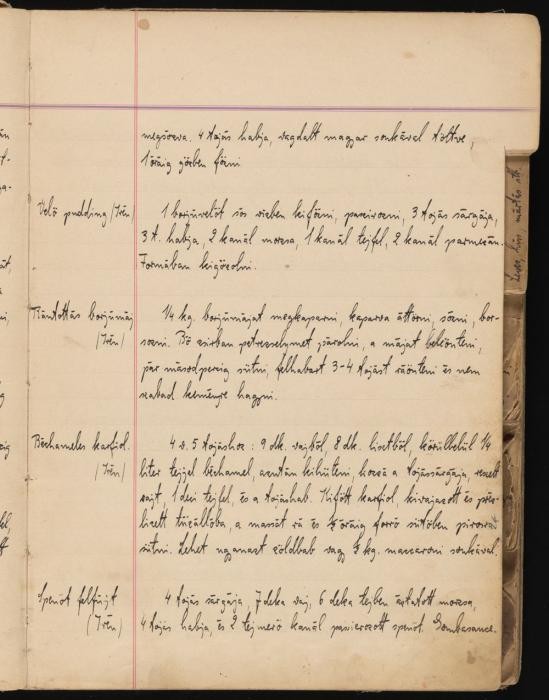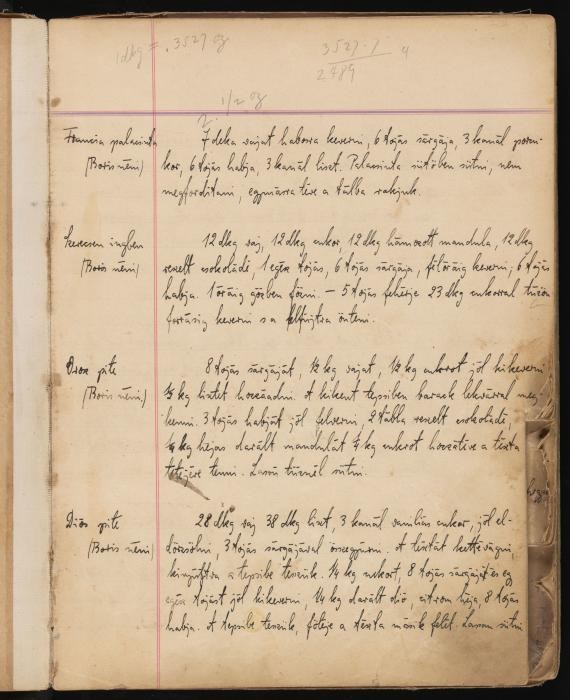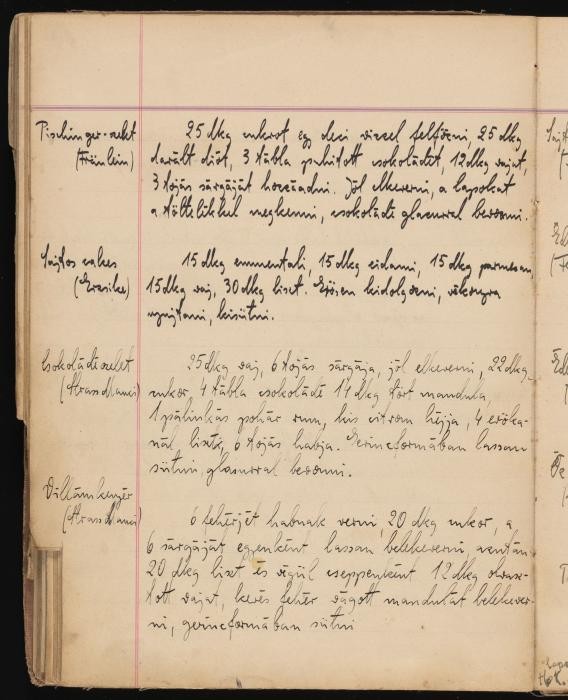Klári Fenyves (also spelled Fenjves) created a family cookbook, written in Hungarian. After the family was forced to leave their apartment before deportation, the family’s cook, Maris, saved this treasured cookbook and some of Klári Fenyves’ artwork. She returned the artwork and the cookbook to the surviving family members after the war.

Steven Fenves (also Fenyves or Fenjves) and his family lived in Subotica, Yugoslavia. His father, Lajos, managed a publishing house and his mother, Klári (Klara), was a graphic artist. In April 1941, Subotica fell under Hungarian occupation. Until May 1944, the Fenyveses lived in one corner of their apartment while Hungarian officers took over the rest of the family’s home.
In March 1944, Germany occupied Hungary. In April, Lajos was deported to the Auschwitz camp in German-occupied Poland. Steven, his sister Estera, mother, and maternal grandmother were forced into a ghetto before being deported to a transit camp and then to Auschwitz.
This page shows a recipe in the Fenyves family cookbook. Klári Fenyves created the cookbook, which was written in Hungarian. After the family was forced to leave their apartment before deportation, the family’s cook, Maris, saved this cookbook and some of Klári Fenyves’ artwork. She returned the artwork and the cookbook to the surviving family members after the war. Estera, Steven, and Lajos had survived, although Lajos died a few months after they were reunited.
Item View
Steven Fenves (also Fenyves or Fenjves) and his family lived in Subotica, Yugoslavia. His father, Lajos, managed a publishing house and his mother, Klári (Klara), was a graphic artist. In April 1941, Subotica fell under Hungarian occupation. Until May 1944, the Fenyveses lived in one corner of their apartment while Hungarian officers took over the rest of the family’s home.
In March 1944, Germany occupied Hungary. In April, Lajos was deported to the Auschwitz camp in German-occupied Poland. Steven, his sister Estera, mother, and maternal grandmother were forced into a ghetto before being deported to a transit camp and then to Auschwitz.
This page shows a recipe in the Fenyves family cookbook. Klári Fenyves created the cookbook, which was written in Hungarian. After the family was forced to leave their apartment before deportation, the family’s cook, Maris, saved this cookbook and some of Klári Fenyves’ artwork. She returned the artwork and the cookbook to the surviving family members after the war. Estera, Steven, and Lajos had survived, although Lajos died a few months after they were reunited.
Item View
Steven Fenves (also Fenyves or Fenjves) and his family lived in Subotica, Yugoslavia. His father, Lajos, managed a publishing house and his mother, Klári (Klara), was a graphic artist. In April 1941, Subotica fell under Hungarian occupation. Until May 1944, the Fenyveses lived in one corner of their apartment while Hungarian officers took over the rest of the family’s home.
In March 1944, Germany occupied Hungary. In April, Lajos was deported to the Auschwitz camp in German-occupied Poland. Steven, his sister Estera, mother, and maternal grandmother were forced into a ghetto before being deported to a transit camp and then to Auschwitz.
This page shows a recipe in the Fenyves family cookbook. Klári Fenyves created the cookbook, which was written in Hungarian. After the family was forced to leave their apartment before deportation, the family’s cook, Maris, saved this cookbook and some of Klári Fenyves’ artwork. She returned the artwork and the cookbook to the surviving family members after the war. Estera, Steven, and Lajos had survived, although Lajos died a few months after they were reunited.
Item View
We would like to thank Crown Family Philanthropies, Abe and Ida Cooper Foundation, the Claims Conference, EVZ, and BMF for supporting the ongoing work to create content and resources for the Holocaust Encyclopedia. View the list of donor acknowledgement.